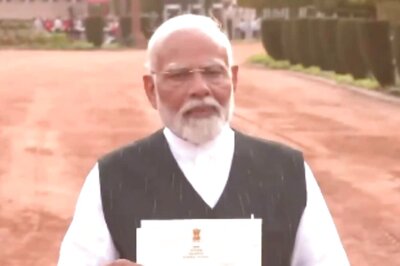
views
United Nations: Actress Angelina Jolie pleaded with world powers Friday to help the millions of Syrian refugees, sharply criticizing the U.N. Security Council for being paralyzed by its division over Syria's four-year conflict.
Jolie briefed the council as special envoy for the U.N. on refugee issues. Syria's ambassador said simply of her presence, "She's beautiful."
Jolie spoke during a full day of briefings on Syria that also included details of a new series of talks next month in Geneva aimed at finding a political solution to the crisis. The U.N. humanitarian chief made a powerful call for sanctions against those blocking the delivery of aid.
Nearly 4 million Syrians have fled the conflict into neighboring countries, which warn they are dangerously overstretched.
"We cannot look at Syria, and the evil that has arisen from the ashes of indecision, and think this is not the lowest point in the world's inability to protect and defend the innocent," Jolie said.
Jolie, who said she has made 11 visits to Syrian refugees in the region since the crisis began in 2011, called strongly for the political will to act. She said the council's powers lie unused because its members cannot agree on how to address the conflict.
Russia, a top Syria ally and backed by China, has vetoed multiple council resolutions on Syria, including an effort last year to refer the situation there to the International Criminal Court. British Ambassador Mark Lyall Grant, in his final council meeting, urged his colleagues to try again and said his "greatest regret" in his post was their collective failure to end the conflict.
Jolie said she would like to see the foreign minister of each of the 15 council members come to the table to negotiate a political solution. She also urged council members to visit Syrian refugees and see the crisis for themselves.
In addition, Jolie spoke briefly about the rising migrant crisis on the Mediterranean, where more than 1,300 migrants fleeing Syria and other places have drowned at sea over the past three weeks.
"It is sickening to see thousands of refugees drowning on the doorstep of the world's wealthiest continent," she said. "No one risks the lives of their children in this way except out of utter desperation."
The world continues to struggle to find a political solution to the conflict, and the U.N. special envoy to Syria warned council members that the talks in Geneva next month should not be seen as negotiations.
Staffan de Mistura said he intends to meet separately with a range of parties if they are ready to move on to negotiations, and he will report results to the U.N. chief by the end of June. The envoy ruled out including the Islamic State group in the talks.
A U.N. diplomat for key Syria ally Iran indicated it would be happy to attend as long as there are no preconditions. The diplomat spoke on condition of anonymity because he was not authorized to speak publicly.
Meanwhile, the U.N.'s outgoing humanitarian coordinator, Valerie Amos, challenged the divided council to mandate a fact-finding mission into the roughly 440,000 Syrians who are besieged in Syria and risk death by starvation, dehydration and the lack of medical care.
"The government, armed and terrorist groups continue to kill, maim, rape, torture and take Syria to new lows that seemed unimaginable a few years ago," she said.
The council should mandate the negotiation of humanitarian pauses to allow the delivery of aid, Amos said, and it should enforce an arms embargo and sanctions for the "shocking lack of respect for the most basic rules of international humanitarian law," including intentional blockage of aid.
U.S. Ambassador Samantha Power told the council that existing resolutions on the crisis "are currently being ridiculed by the Syrian regime."
The U.N. refugee chief, Antonio Guterres, told the council that 14 million people are now displaced in the "interlinked crises" in Syria and Iraq, where the Islamic State group seized territory in the past year.
He called for "massively increased support" for Syria's neighbors under the flood of refugees, pointing out that as Lebanon and Jordan are considered middle-income countries, the World Bank can't give them grants for efforts to deal with the "severe demographic shock they have endured."




















Comments
0 comment